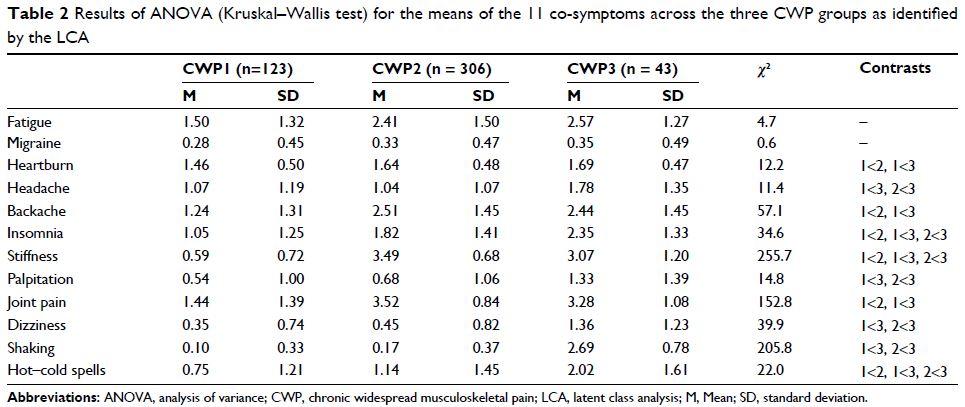109451
论文已发表
注册即可获取德孚的最新动态
IF 收录期刊
- 3.4 Breast Cancer (Dove Med Press)
- 3.2 Clin Epidemiol
- 2.6 Cancer Manag Res
- 2.9 Infect Drug Resist
- 3.7 Clin Interv Aging
- 5.1 Drug Des Dev Ther
- 3.1 Int J Chronic Obstr
- 6.6 Int J Nanomed
- 2.6 Int J Women's Health
- 2.9 Neuropsych Dis Treat
- 2.8 OncoTargets Ther
- 2.0 Patient Prefer Adher
- 2.2 Ther Clin Risk Manag
- 2.5 J Pain Res
- 3.0 Diabet Metab Synd Ob
- 3.2 Psychol Res Behav Ma
- 3.4 Nat Sci Sleep
- 1.8 Pharmgenomics Pers Med
- 2.0 Risk Manag Healthc Policy
- 4.1 J Inflamm Res
- 2.0 Int J Gen Med
- 3.4 J Hepatocell Carcinoma
- 3.0 J Asthma Allergy
- 2.2 Clin Cosmet Investig Dermatol
- 2.4 J Multidiscip Healthc

Exploring symptoms of somatization in chronic widespread pain: latent class analysis and the role of personality
Authors Burri A, Hilpert P, McNair P, Williams FM
Received 15 April 2017
Accepted for publication 15 June 2017
Published 24 July 2017 Volume 2017:10 Pages 1733—1740
DOI https://doi.org/10.2147/JPR.S139700
Checked for plagiarism Yes
Review by Single-blind
Peer reviewers approved by Dr Colin Mak
Peer reviewer comments 2
Editor who approved publication: Dr Michael Schatman
Abstract: Chronic
widespread musculoskeletal pain (CWP) is a condition manifesting varied
co-symptomatology and considerable heterogeneity in symptom profiles. This
poses an obstacle for disease definition and effective treatment. Latent class
analysis (LCA) provides an opportunity to find subtypes of cases in
multivariate data. In this study, LCA was used to investigate whether and how
individuals with CWP could be classified according to 12 additional somatic
symptoms (migraine headaches, insomnia, stiffness, etc.). In a second step, the
role of psychological and coping factors for the severity of these co-symptoms
was investigated. Data were available for a total of N = 3,057 individuals
(mean age = 56.6 years), with 15.4% suffering from CWP. In the latter
group, LCA resulted in a three-class solution (ngroup1 = 123; ngroup2 = 306; ngroup3 = 43) with groups differing in a graded fashion (i.e., severity)
rather than qualitatively for somatic co-symptom endorsements. A consistent
picture emerged, with individuals in the first group reporting the lowest
scores and individuals in group 3 reporting the highest. Additionally, more
co-symptomatology was associated with higher rates of anxiety sensitivity and
depression, as well as more extraversion and emotional instability. No group
differences for any of the coping strategies could be identified. The findings
suggest that CWP has several detectable subtypes with distinct psychological
correlates. The identification of CWP subgroups is important for understanding
disease mechanisms and refining prognosis as well as stratifying patients in
clinical trials and targeting specific treatment at the subgroups most likely
to respond.
Keywords: anxiety sensitivity, extraversion, depression, emotional stability, somatoform
symptoms
